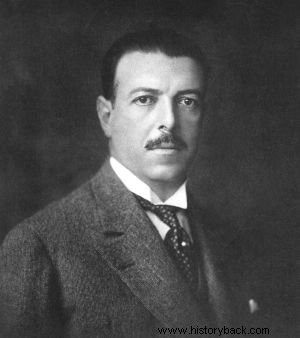Júlio Prestes was one of the elected presidents of Brazil by popular vote in the period of the Old Republic (1889-1930), after the government of Washington Luís.
However, he was prevented from holding the position, due to the 1930 coup, led by politician Getúlio Vargas. He also excelled in literature and law, practicing the legal profession.
 Júlio Prestes was prevented from exercising his position
Júlio Prestes was prevented from exercising his position
Biography of Júlio Prestes
Júlio Prestes de Albuquerque was born on March 15, 1882, in Itapetininga, in the interior of São Paulo.
Son of Colonel Fernando Prestes de Albuquerque, elected president of São Paulo (1898-1900), a position that is currently called “governor”, and of Dona Olímpia de Sant'Anna Prestes, Júlio followed in his father's footsteps and had an important political career.
Thus, he attended primary studies in his hometown and secondary studies at the State Gymnasium, in the city of São Paulo. In 1906, he graduated from the Faculty of Law of São Paulo, practicing the profession of lawyer and later distinguished himself in politics.
He married Alice Viana Prestes, with whom he had 3 children. He died in São Paulo, on February 9, 1946, aged 63.
Government of Júlio Prestes
Júlio Prestes began his political career in 1909, being State Deputy in São Paulo until 1923, for the Paulista Republican Party (PRP).
For three years, that is, from 1924 to 1927, he was elected Federal Deputy. In addition, he was governor of the State of São Paulo from 1927 to 1930, and he remained from July 17, 1927 to May 21, 1930.
In 1930 , Júlio Prestes ran for the Presidency of the Country, being elected President of Brazil. He was the only president in the history of the country prevented from taking office.
At that time, Brazil was marked by a system of alternation of power that became known as the "Policy of coffee with milk", (coffee, symbology to indicate the paulistas, and milk, to indicate the mineiros), in which the paulistas and miners alternated the presidency of the country through the oligarchies of Minas Gerais and São Paulo, which, supported by the colonels, ascended to power.
The situation changed when, with the coup of 1930 , Prestes was prevented from assuming the presidency, and the gaucho Getúlio Vargas (1882-1954) ascended to power.
After the act, Júlio Prestes remained in exile in Europe until 1934, and when he returned to Brazil, he decided to leave politics permanently.
Almost a decade later, in 1945, with the deposition of Getúlio, he founded and was director of the UDN (National Democratic Union), dying the following year.
Learn more about the topic:
- First Republic
- Old Republic
- Coffee with Milk Policy
Revolution of 1930
Despite having been elected president of the country, on March 1, 1930, against the liberal gaucho Getúlio Vargas, Júlio Prestes was prevented from taking office as President of the Republic of Brazil, by the Revolution of 1930, which began on October 3 , headed and articulated by Vargas, which put an end to the “coffee with milk” political system.
Thus, the carioca, who considered himself from São Paulo, Washington Luís (1869-1957), who at the time ruled the country, was deposed on October 24, 1930 by the military coup led by Getúlio, putting an end to the Old Republic.
In 1929, Washington Luís nominated the politician Júlio Prestes to assume the position of presidency of the country, however, this displeased the miners, who foresaw a state nomination, since the coffee with milk policy alternated between paulistas and mineiros in power. .
However, Júlio Prestes, who had the majority of votes, especially for the state of São Paulo, almost 90% (totaling 1,091,709 votes, against 742,794 for Getúlio Vargas), was prevented from governing by the Aliança Nacional LibertadoraNational Liberation Alliance. strong> (ANL), made up of the states of Minas Gerais, Paraíba and Rio Grande do Sul, which alleged electoral fraud (in the counting of votes).
In addition to the popular discontent that spread across the country, due to the economic crisis of 1929 (the crash of the New York Stock Exchange), the murder of João Pessoa, vice president of the Liberal Liberal Alliance, murdered by Brazilian journalist and lawyer João Dantas , was the trigger to remove Júlio Prestes from power.
To learn more:
- Getúlio Vargas
- Era Vargas
- Revolution of 1930
1932 Revolution
As a response to the coup given by Getúlio, the São Paulo citizens, dissatisfied with the deposition of the president, organized a movement that became known as the 1932 Revolution, the 1932 Constitutionalist Revolution or the Paulista War.
Learn more:Revolution of 1932.
Works by Júlio Prestes
In exile, Júlio Prestes devoted himself to literature, which he said was a childhood passion. He wrote poetry of which stand out:“Brutus” and “Prece.”
Below is the poem “prece” (1932), written in Portugal during exile:
At church
Of Grace
in Beja,
Exists
A Our Lady of Saudade
Her joy is a sad joy
But now sadness is a source of kindness
A tear wins your smile
And there is in the splendor of your youth
The glare of an uncertain twilight
Illuminating a longing.
This is the Saint of Expatriates
That blooms and thrives
In the hearts of exiles
Who pray in this church
Our Lady of Longing,
Patroness of Portugal
Lady of those who suffer, of those who grieve
Far from yours and your home country.
